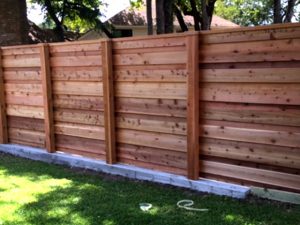Dallas Fence Regulations
Jul 21, 2016
Fencing is a necessary part of your home that provides multiple functions. It protects your house as well as adds beauty and value to it. Fences are able to set the boundaries of your property in an effective manner and ensure that people can understand where it begins and ends. Before you fence your yard or home be sure to take note of Dallas fence regulations.
Dallas is a wonderful city in Texas, which is famous for its comfortable homes and larger lots as compared to the ones found in metropolis cities such as New York. It is however, important for any Dallas native to follow fence regulations that allow them to beautify their home while also providing basic security as per the governing laws. Here, we aim to look at the fence regulations that are present in Dallas.
Dallas Building Code for Fences
The Dallas building code provides all the details about the fencing that can be used to cover residential properties. It has details about the structure of the fences as well as the permits that are required. A fencing permit is only required in the city when building a blocking structure of over four feet in height.
The normal fences therefore, can be up to four feet high. Barbed wire can only be used in fence constructions that are over six feet high due to safety purposes. All fences need to provide access to the sides and the rear of the property for emergency tasks such as firefighting.
Fences in the rear or sides of the property can be up to nine feet high. Fences cannot be installed in easements according to the city laws. There are special requirements for fences that enclose swimming pools.
Dallas also has different requirements for districts that are declared historical landmarks by the state government. The fences there cannot be high and need to be of a particular strength and structure. All fences should be erected in a manner so as to not affect the visibility on the street.
It can often be difficult to understand what building codes apply to you or whether you require a permit for a particular fence construction or not. You should contact a fence construction contractor in this case, who will be able to better guide you regarding your particular fencing needs. You can also check the Dallas City Website to find additional details about Dallas fence regulations.
How to Find Property Lines
Once you have viewed the rules and regulations that apply to your property, it is time to review your property deed in order to clearly find the corners of your property. You can mark these corners with a stake and ensure that you do not cause any disputes with a neighbor or a city official.
You may not understand the language mentioned in your deed. In this case, you can always contact your county recorder to provide a map of your particular street. This will help you in achieving the required demarcations. If there is still uncertainty, you can always hire a surveyor who will help you mark your boundaries. You should always get this work done before starting a fencing project.
Fencing and Neighbors
Fencing activities always affect your neighbors so it is best if you discuss your fencing project with them beforehand. A meeting with the neighbors allows you to inform them of the new visual elements being installed. Remember, this is not legally required, but it does have its value.
It is an act of courtesy that will keep you away from any legal issues in the future. You should first learn the local laws and then talk it out with the neighbors. This way, you can be sure that everyone is on the same page regarding the project and there is no danger of facing a legal dispute.
The best way to go about informing a neighbor is to hold a direct meeting. A face to face discussion is excellent for clearing complex concepts and creates a social bond with the neighbors. You need to present your plan to a neighbor in a statistical fashion, but should act enthusiastically when listening to the concerns presented by them. Your aim should always remain to cooperate and find mutually beneficial solutions to disputes.
Fencing Solutions
There are many types of materials which can be used to construct fences. They can be prepared ideally from either wood or metal. Each material has its own benefits and limitations. Fences can also be classified in terms of a solid structure or an ornamental structure.
Solid faces are usually prepared from cedar wood and offer stiff resistance against weather elements as well as stray wildlife and plantation. Solid wood fencing is often made with planks. Iron fences can either be prepared from pipes and fittings or from the lighter chain link material. The chain link fence is often used to cover larger properties, but it can be similarly employed to form the fence of a residential property as well.
Many people like to complete their personal fencing project on their own. Such individuals can easily procure the building materials for fencing their outer boundaries without any worries. Wood is an excellent solution in order to construct boundaries that will last a lifetime. Wood though, requires additional care as you need to treat it in order to prevent the buildup of insects and fungus. In contrast, light metallic fences are excellent for use as they can easily be welded together and prepared from smaller pipes, rods and connecting elements.
A Final Word on Dallas Fence Regulations
You need to understand the Dallas fence regulations first before going through with a fencing project in the city. An excellent project can be undertaken when neighbors are taken on board with the plan. There are also various companies that offer excellent fence construction services. For best results, it is important to realize the requirements that must be met for your particular fencing needs.
Sources

